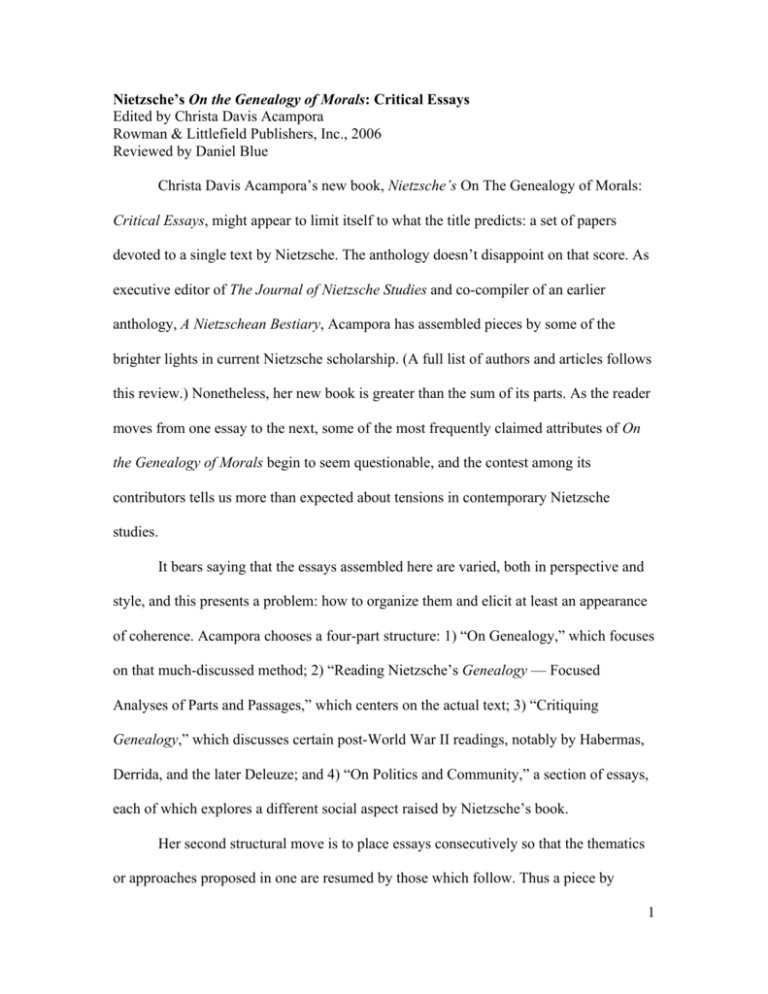
Nietzsche’s On the Genealogy of Morals: Critical Essays
Edited by Christa Davis Acampora
Rowman & Littlefield Publishers, Inc., 2006
Reviewed by Daniel Blue
Christa Davis Acampora’s new book, Nietzsche’s On The Genealogy of Morals:
Critical Essays, might appear to limit itself to what the title predicts: a set of papers
devoted to a single text by Nietzsche. The anthology doesn’t disappoint on that score. As
executive editor of The Journal of Nietzsche Studies and co-compiler of an earlier
anthology, A Nietzschean Bestiary, Acampora has assembled pieces by some of the
brighter lights in current Nietzsche scholarship. (A full list of authors and articles follows
this review.) Nonetheless, her new book is greater than the sum of its parts. As the reader
moves from one essay to the next, some of the most frequently claimed attributes of On
the Genealogy of Morals begin to seem questionable, and the contest among its
contributors tells us more than expected about tensions in contemporary Nietzsche
studies.
It bears saying that the essays assembled here are varied, both in perspective and
style, and this presents a problem: how to organize them and elicit at least an appearance
of coherence. Acampora chooses a four-part structure: 1) “On Genealogy,” which focuses
on that much-discussed method; 2) “Reading Nietzsche’s Genealogy — Focused
Analyses of Parts and Passages,” which centers on the actual text; 3) “Critiquing
Genealogy,” which discusses certain post-World War II readings, notably by Habermas,
Derrida, and the later Deleuze; and 4) “On Politics and Community,” a section of essays,
each of which explores a different social aspect raised by Nietzsche’s book.
Her second structural move is to place essays consecutively so that the thematics
or approaches proposed in one are resumed by those which follow. Thus a piece by
1
Acampora herself is trailed by a paper by Paul S. Loeb which extends her findings in a
wholly new direction. A selection by Jürgen Habermas is succeeded by a riposte from
Gary Shapiro. A paper by Alexander Nehamas comparing the Genealogy with
Nietzsche’s essay, “On the Uses and Disadvantages of History for Life,” follows on the
heels of David Owen’s comparison of the Genealogy with Daybreak. Babette Babich’s
contribution, which, among other matters, discusses the way the Nietzschean aphorism
“implicates the reader in the reading,” is followed by Ken Gemes’s suggestion that the
entire book is a snare designed to lure the reader into confronting unexamined ideals.
Similarly, while not immediately consecutive, essays by David Owen and Aaron Ridley
echo one another as each examines the argumentative strategies of the Genealogy and
whether these will convince those who do not share Nietzsche’s vision of the world.
While the book contains many striking articles, one of the more challenging is by
Acampora herself. Entitled, “On Sovereignty and Overhumanity: Why It Matters How
We Read Nietzsche’s Genealogy II:2,” it takes the much cited notion of “the sovereign
individual” and claims that this figure neither represents Nietzsche’s ideal nor the peak of
humanity in his view. At stake here is the sort of sovereignty Nietzsche might approve,
and whether the new humanity which he invokes at the end of Genealogy II is the
individual apostrophized earlier or someone quite new. Also, given the sovereign
individual’s position in Genealogy II, Acampora’s reinterpretation inevitably carries
implications for understanding other Nietzschean topics such as the value of memory and
conscience. Just as important, for Nietzsche studies at least, is the immense amount of
recantation which will be necessary if Acampora is correct, for virtually everyone who
has written on Nietzsche and ethics has assumed that the sovereign individual presented
2
in Genealogy II:2 is a touchstone of probity and achievement. If Acampora’s
interpretation prevails, then many a book and essay, including several in this volume, will
have to be rewritten.
While there is not space here to discuss all the articles collected in this anthology,
mention might be made of Robert B. Pippin’s “Lightning and Flash, Agent and Deed
(GM I: 6-17),” in which he addresses an apparent inconsistency which has perplexed
other readers of the Genealogy. On the one hand Nietzsche attacks the notion of a subject
behind the deed. In his view this idea is not only false, but pernicious, leading to the
ascription of free will and thereby responsibility to those who do not observe the slave
code of values. In Nietzsche’s well-known example, the lambs blame the eagles for not
behaving like lambs, as though it lay in their power not to act like the eagles that they are.
As against this theory, Pippin observes that all of us (Nietzsche included) distinguish
between a mere movement and a deed. Clearly, some notion of intentionality and subject
seems to be called for here. Beyond this, Nietzsche’s account of the slave revolt
necessarily devolves upon an unspoken overlay of intentions. The slaves see themselves
as operating by one set of motives (humanitarian values) while in fact enacting another
(displacing the nobles). How can such divided purpose be possible without introducing
some entity in addition to the deed itself? Pippin finds an answer in a theory of
expressivity already available in Hegel whereby the doer is “in” but not “behind” the
deed.
Although the book contains numerous other essays as interesting and important as
the two just mentioned, it presents something of an embarrassment of riches. Anthologies
are inevitably double-edged because, by definition, their contents are heterogeneous.
3
Positively, they provide a sort of one-stop shop where one can find assembled articles
which would otherwise have to be searched out in multiple journals. The negative is
obvious to anyone who tries to read one from cover to cover. While a work written by a
single author allows readers to pick up the ground rules — range of vocabulary, modes of
argumentation — right from the introduction, an anthology starts fresh with every entry.
The effect can be something like encountering a smorgasbord where one is expected to
sample every dish. Each looks tasty, but the overall prospect can overwhelm.
The problem is acute in this collection because the articles are so varied, not just
in conclusion but in approach. David Owen, Aaron Ridley, Babette Babich and Ken
Gemes all discuss the strategies Nietzsche uses to overcome readerly resistance, but they
make quite different assumptions as to his procedures. The former pair construe his
attempt in terms of logic and argument, whereas the latter view the book as an exercise in
seduction, where personal involvement of the reader is as important as validity of proof.
To choose another example, Babich, in a discussion of how aphorisms are ingested, cites
the ways a Christian anti-Semite who reads Genealogy I might be “hooked,” then
undone. Yirmiyahu Yovel, discussing the same passages, takes Nietzsche at his word and
devises a tripartite categorization to accommodate the apparently anti-Jewish strictures in
that section. Ken Gemes proves helpful here by making a distinction between manifest
and latent content. Babich has arguably chosen to emphasize the latent, Yovel the
manifest content of Nietzsche’s work. (Of course, Babich might claim that her focus is on
process, not content, but it is content which baits the hook for the anti-Semite.)
A similar contrast can be found between Gemes’s own article and a paper by
Daniel Conway. Gemes who, like Babich, favors latent content, interprets the Genealogy
4
as a kind of psychological labyrinth whereby Nietzsche cites anthropological narratives
less for their intrinsic truth than to lure the reader into a maze leading to self-awareness.
Conway, by contrast, views the book’s characters and types, particularly the “beasts of
prey,” as actors in a narrative meant to be factual or, at least, coherent on its own terms.
He therefore interprets Genealogy, not from the point of view of a reader engaging with
the text, but “objectively,” as proposing a history of humankind, a version of how we
became a moralized species.
Daunting as such variety can be, it is arguably built into the book from the start,
and not just because this is an anthology. In her introduction Acampora moves through
the German title of the work — Zur Genealogie der Moral: eine Streitschrift — and finds
every word, except for the two articles, difficult to translate. Should “Zur” be rendered
“On the” or “Toward the”? At issue is not just the finality of Nietzsche’s contribution to
his project but the extent to which he believes humanity’s history is itself defined as well.
In other words, does the Genealogy reveal, “How We Have Became What We Are,” the
title of Conway’s paper? Or does Nietzsche consider (as Paul S. Loeb contends) that a
new turn in the road is possible and imminent, bringing with it a fresh definition of the
human animal? This too would have implications for the translation of “zur.”
The second term of the title, “Genealogie” might seem more straightforward but,
as Acampora reminds us, it devolves on three other words, “Herkunft,” “Ursprung,” and
“Entstehung,” each of which translators tend to fudge. Nonetheless, these three words
suggest three decidedly different ways we could construe Nietzsche’s task. Is his purpose
to propose a descent (Herkunft) as in “descent of man,” or is this a story about “original
condition” (Ursprung), wherein the latter, like Eden, enjoys some primal value?
5
Alternatively is Nietzsche giving us a naturalistic account of the emergence (Entstehung)
of morality among human beings? And what of “Moral,” which might mean “morals” (as
in one unique set) or “morality,” a broader term which encompasses not only the
intrinsically normative rubrics by which humankind has disciplined itself but the moral
enterprise altogether? As for “Streitschrift,” is the book a polemic directed against
Nietzsche’s contemporaries or is it a contest of voices within itself?
Acampora’s exploration of the title’s ambiguities exposes a theme never made
explicit but discernible in many of the twenty essays gathered in this anthology. On the
Genealogy of Morals is popular in part because it seems comparatively tidy and unitary
among Nietzsche’s works. Unlike those which range over an apparent miscellany of
issues — theories of knowledge, politics, history, the sexes, the arts, academia, Germany
— the Genealogy is distinguished by simplicity of form: three parts, each devoted to
fresh and provocative exploration of specific moral concepts. In fact, of course, it is
riddled with eruptions of contested meaning which, like each of Nietzsche’s other works,
makes any attempt at summation hazardous to attempt. Such approaches have been tried
(brilliantly in Aaron Ridley’s Nietzsche’s Conscience, somewhat more ploddingly in
Brian Leiter’s Nietzsche on Morality), but several essays in Acampora’s anthology (most
notably Gary Shapiro’s) suggest that such ambitions might be misguided.
This is not to say that they are not useful. To extend a suggestion made elsewhere
by Babich,i we might divide contemporary philosophers into two camps: those who seek
solutions and those who seek questions. The former set up standards of evidence and
argument and seeks to settle issues definitively. They want to “get things right.” The
essays by Ridley, Owen, Conway and Yovel would fall into this category, as would,
6
arguably, the essays by Pippin, Acampora and Loeb. The second group prizes freshness
and inventiveness of thought as well as a certain indeterminancy in language
commensurate both with humility (there is much we don’t know) and the mysteries of
experience. While not necessarily hostile to the tidy and closed, one suspects that this
group’s collective heartbeat quickens, not when a problem is solved, but when some
deep-seated ambiguity, either of doctrine or structure, is exposed. Babich’s and Shapiro’s
articles would fall under this heading. So, for that matter, would Acampora’s
introduction, which suggests that she manages to inhabit both camps.
Both approaches are essential to a healthy intellectual life. The explainers run the
danger of reducing texts to pedantic summations. The questioners can fly into a neverland
of vapid speculation. At their best and held in dynamic tension, each informs the other,
the definers acting as a constraint on the questioners, the questioners stimulating the
definers by their bold reconsiderations. In Acampora’s anthology both are at play, and
while neither has the last word, both display their specific strengths, broadening our
vision of the Genealogy even as they home in and illuminate the exact meaning of
specific texts. One conclusion, however, is guaranteed. Anyone who reads this book will
find their vision of Nietzsche’s On the Genealogy of Morals expanded and enriched.
Contents
Introduction
In the Beginning: Reading Nietzsche’s On the Genealogy of Morals from the Start –
Christa Davis Acampora
Part I. On Genealogy
1. A “Dionysian Drama on the ‘Fate of the Soul’”: An Introduction to Reading On
the Genealogy of Morality – Keith Ansell Pearson
7
2. Nietzsche, Re-evaluation, and the Turn to Genealogy – David Owen
3. The Genealogy of Genealogy: Interpretation in Nietzsche’s Second Untimely
Meditation and in On the Genealogy of Morals – Alexander Nehamas
4. Nietzsche’s Style of Affirmation: The Metaphors of Genealogy – Eric Blondel
5. Nietzsche and the Re-evaluation of Values – Aaron Ridley
6. Genealogy, the Will to Power, and the Problem of a Past – Tracy B. Strong
Part II. Reading Nietzsche’s Genealogy – Focused Analyses of Parts and Passages
7. Slave Morality, Socrates, and the Bushmen: A Critical Introduction to On the
Genealogy of Morality, Essay I – Mark Migotti
8. Lightning and Flash, Agent and Deed (GM I:6-17) – Robert B. Pippin
9. On Sovereignty and Overhumanity: Why It Matters How We Read Nietzsche’s
Genealogy II:2 – Christa Davis Acampora
10. Finding the Übermensch in Nietzsche’s Genealogy of Morality – Paul S. Loeb
11. The Genealogy of Morals and Right Reading: On the Nietzschean Aphorism and
the Art of the Polemic – Babette E. Babich
12. “We Remain of Necessity Strangers to Ourselves”: The Key Message of
Nietzsche’s Genealogy – Ken Gemes
13. Nihilism as Will to Nothingness – Wolfgang Müller-Lauter
Part III. Critiquing Genealogy
14. The Entwinement of Myth and Enlightenment – Jürgen Habermas
15. Translating, Repeating, Naming: Foucault, Derrida, and the Genealogy of Morals
– Gary Shapiro
16. Nietzsche, Deleuze, and the Genealogical Critique of Psychoanalysis: Between
Church and State – Alan D. Schrift
Part IV. On Politics and Community
17. Nietzsche’s Genealogy: Of Beauty and Community – Salim Kemal
8
18. Nietzsche and the Jews: The Structure of an Ambivalence – Yirmiyahu Yovel
19. Nietzschean Virtue Ethics – Christine Swanton
20. How We Became What We Are: Tracking the “Beasts of Prey” – Daniel W.
Conway
Reviewed by Daniel Blue
All Rights Reserved. © Daniel Blue-Nietzsche Circle, 2007
Babette E. Babich. “On the Analytic-Continental Divide in Philosophy: Nietzsche’s
Lying Truth, Heidegger’s Speaking Language, and Philosophy” in C.G. Prado, ed. A
House Divided: Comparing Analytic and Continental Philosophy (Amhearst, NY:
Humanity Books, 2003), pp. 63-104, esp. pp. 64-65. In Babich’s article, the contrast is
between continental philosophers who prize questioning and analytic philosophers who
try to resolve traditional philosophic issues into pseudo-problems.
i
9









